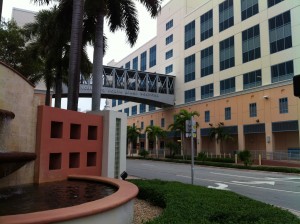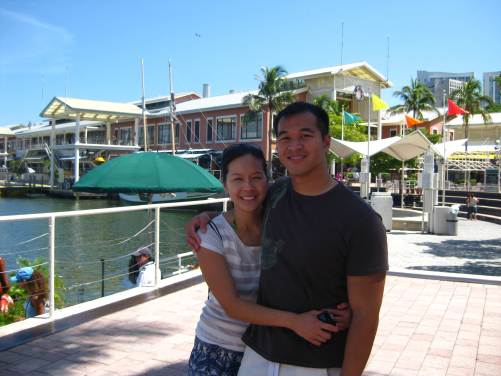Pediatric Rotation in Miami

Yet again, I have finished another rotation… pediatrics is DONE! I just took my NBME shelf exam for pediatrics on Friday in Miami, and now as I write this, I am in the middle of New York City, about to start my next rotation in family medicine at Bronx-Lebanon Hospital for the next 6 weeks. I am going to miss Miami and Irene for these next few weeks, and it will be a change. Apparently from what I hear from other students, rotations in NYC are a lot tougher than the ones in Miami, which are relatively laid-back with good hours. Here in the Bronx, from what I hear, students get the tough treatment. I don’t know if it’s true yet, but I’ll find out soon. Perhaps it’s good for me… I do need to toughen up a bit, and what better way to do this than to live and work in NYC?
For those interested, I’ve put together some information about the pediatric rotation in Miami. Check it out:
Disclaimer: The pediatric rotation curriculum in Miami is currently being reorganized, so the information here may or may not hold true for the future.
How is the rotation scheduled?
Pediatric rotations at AUC are 6 weeks long. Here in Miami, usually you get 6 weeks of outpatient experience, but within those 6 weeks, you also simultaneously do a week of nursery rounds as well as a week of pediatric emergency rounds (or so they are planning). Every week, there is also a lecture, which usually lasts 2 hours. During the non-summer months, students are also required to go to Grand Rounds on Friday mornings at Miami Children’s Hospital. They do not have Grand Rounds during the summer. We are allowed to get one study day.
Are there any assignments to do?
Yes. Each week, students are required to do two SOAP notes on cases we saw. Each attending may have a different way they want you to do SOAP notes, but the SOAP notes are graded (on an evaluation form) and signed by the attendings. By the end of the rotation, you’ll have 12 SOAP notes total, which we then turn in to the peds rotation director or manager. On our last lecture at the end of the rotation, we also have to do a 20 minute presentation in front of the class on any pediatric topic of our choosing, but preferably involving a real case we actually saw in our rotations. And of course, there is the NBME shelf exam that we must pass at the end of the rotation.
How are you graded?
You give an evaluation form to each attending that you rotate with, including the nursery and emergency rounds. Each attending will fill out the evaluation and fax it to MBCHC themselves. By the end of the rotation, you will also have 12 SOAP notes written and graded. And you will also be evaluated on your presentation you give at the end of the rotation. Looking at all of these, the director of the peds rotation will issue a final grade, either as pass, fail, or honor. In addition, you must pass the NBME shelf exam for pediatrics to pass the rotation. If you don’t pass the shelf exam, you’re given another chance to pass it again. If you don’t pass it again, then you’ll have to retake the entire rotation.
What are nursery rounds?
Nursery rounds are usually in the afternoon or evening, and so you go to it after your morning shift with your normal attending. In the nursery, you’ll see and learn to examine newborn babies just a few hours to a few days old. They take place at Mt. Sinai Hospital in Miami Beach and you’re assigned a doctor to rotate with for a week.
Do you get to do much?
It depends on the attending. For some attendings, you’ll mainly be shadowing. For others, you’ll get to see patients by yourself, like taking history, physical exam, assessment/plan, and present to the attending. There are some attendings that teach a lot, while others may not as much, and you’ll have to be more proactive. Some attendings have 10am-4pm schedules, while others have 8am-5pm. It all depends on who you’re assigned to. In my experience, whether or not they let you do much, most attendings are pretty nice and laid-back. If you hear from another student about a good attending that he/she liked and you want to request a particular attending to rotate with, I’d recommend doing so before the start of the rotation.
Who do you rotate with?
Usually, you rotate directly with the attending, as well as up to 3 other students (though most of the time, it’s just 1 or 2 others). In Miami, AUC students rotate with other medical students from Ross University as well as Nova Southeastern University (DO school in Miami).
Where do you rotate?
You may be placed with doctors who work at several different hospitals around Miami, such as Mt. Sinai, any of the three branch sites of MBCHC, and other clinics. The Friday Grand Rounds take place at Miami Children’s Hospital. Lectures are usually at MBCHC’s Biscayne Boulevard site, where the MBCHC administrative office is located.
What is the dress code?
For guys, nice pants, button-up shirt, tie, nice shoes, white coat. For girls, business professional + short white coat. Some attendings will allow you to wear scrubs under your white coat, but it’s safer to wear business professional on the first day, then ask your attending what he/she prefers you to wear. As for lecture, you will also be required to wear either scrubs or professional, but you don’t have to wear your white coat to lecture. You will also be required to wear the ID of the hospital you are rotating that day, and then return your ID when you are finished with the rotation.
What should I bring with me on my rotation?
Bring a stethoscope, as you will be using it quite a lot. If you want, you can also bring a notebook and pen to record your patient notes in. Also bring a textbook (or iPad) to reference or to study with in case you have some downtime. If you have an iPhone, iTouch, or some other smart phone, great! You can download some awesome apps that are very useful for your rotations. Check out my post here: iPhone Apps for Clinical Rotations.
Are there any textbooks that are helpful?
While there are no required textbooks for peds, some people have found BRS Pediatrics or Case Files Pediatrics
to be helpful, as they both present the major topics in peds for you to pass the exam. If you like learning via cases, Case Files is definitely good as it makes you think. If you are interested in going into a peds residence, then you could consider investing in a The Harriet Lane Handbook
. Just about every pediatrician I rotated with has this book, and it’s a handy reference to use. Otherwise, it has too many details for the average medical student.
When would I know which hospital and attending physician I will be rotating with?
You will usually receive an email a few weeks before your rotation starts, telling you the time and place of the orientation for your peds rotation. This orientation takes place on the first official day of your rotation, and it is here where you will take a picture for your ID, review and sign some paperwork, and receive your schedule for your peds rotation, including the hospital and physician you will be rotating with and their contact information. They will also give you directions on when and where to meet your attending for the first time. However, I would highly suggest calling your attending just to confirm with them personally, not to mention to be friendly and to simply say hi. The orientation usually takes place at MBCHC’s office in North Miami (Biscayne Boulevard).
Will I need to know Spanish?
While knowing Spanish is not required, I personally would highly recommend that you learn some before you come. Miami is unique in being one of the few major cities in the United States in which English is actually the minority. Spanish rules here. Practically everyone here uses it on the street as well as in the workplace, and this is true in the hospitals as well. The majority of patients you will see will be Spanish speakers, and most doctors, even those where Spanish is not their native language, will actually also know how to speak the language. If you don’t understand, they may be nice enough to conduct the interviews in English or at least translate for you. However, that may not happen every time, and it will help you if you at least know the basics to know roughly what’s going on. For Spanish learners like me, this rotation in Miami has actually been an amazing opportunity for me to get immersed in the language and improve my skills. I’d say about 80% of the patients I’ve seen so far are Spanish speakers (though most also know some English as well). It will definitely put me at an advantage in the future when Spanish will become increasingly important in this country, and our society will need more doctors who know Spanish.














Hi.
I was wondering if at AUC its possible to do more than one rotation at one hospital.
Thanks and good luck to you!!
Hi Amina,
Yes, you can do several rotations in one clinical site. There are even some hospitals where you can do all of your core rotations and/or electives.
Best,
Benji
Hi Benji,
Glad to see you most of my getting near the goal line. I did most of my PA rotations in Miami and was planning on returning after the first of the year to do rest. Still not getting much from clinical dept. I have been told that we do have sites back and just legal details remain. Let me know if you have any knowledge of whats up.
Thank’s–Freddy
Hi Benji, I’ve been following your post for the past 2 1/2 yrs of my meed school career and i’m now in clinicals. I was wondering if you can share any advice on what resources to use to study for peds rotation. Any tips would be greatly appreciated. Thanks.
Hey Alecia!
Thanks for following me and so great that you are in peds now. People use all sorts of resources, and I don’t think it really matters which one. First Aid for Pediatrics is always a safe choice for students, but if you want to get a practical guide for practice, Mass General’s Pocket Pediatrics or even Harriet Lane Handbook are good, although this last one is a little bit dense and really only needed if you truly want to go into peds. Just choose one and stick with it.
Benji
Hi Benji,
I just got accepted to AUC & your blog has really helped me make a decision to attend there this upcoming September. I was wondering what students do for living arrangements during clinical rotations. I imagine it’s hard to secure a lease for such a short period of time and was wondering if the hospitals offer some sort of accommodations.
Thanks!
Hi Jennifer,
Congrats on getting into AUC. Some hospitals offer accomodations, which can be hit or miss, but for the most part students just find their own housing. For short term stays, I use airbnb. Best of luck in med school.
Benji